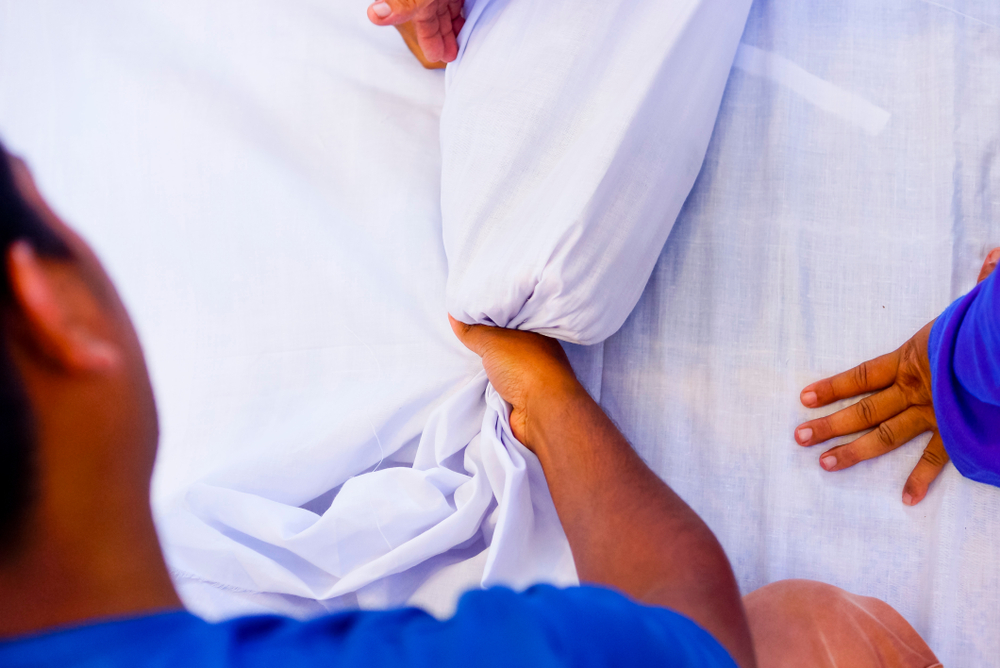Can The Deceased’s Spouse Wash the Body?
Shafi'i Fiqh
Answered by Shaykh Irshaad Sedick
Question
Can the deceased’s spouse wash the body, according to Shafi‘i Fiqh?
Answer
In the Name of Allah, the Most Merciful and Compassionate. May Allah alleviate our difficulties and guide us to what pleases Him. Amin.
When it comes to the solemn act of washing the deceased, specific guidelines are outlined depending on the gender and religious affiliation of the departed soul. Here is a summary of these guidelines based on Ibn Al-Naqib Al-Misri’s ‘Umdat al-Salik:
For Deceased Males
- The primary choice to wash the body is the father of the deceased.
- If the father is unavailable, the order of preference includes the father’s father, the son, the son’s son, the brother, the father’s brother, the son of the father’s brother, and those named in a specific sequence.
- Following these male relatives, other men related to the deceased may proceed.
- Non-related men may wash the body after the male relatives.
- The wife of the deceased and unmarriageable female relatives are the last in the order of preference for washing a male’s body.
For Deceased Females
- The preferred choice to wash the body is one of her female relatives, particularly her immediate family, like her daughter or mother.
- Other women can participate in the washing process if female relatives are unavailable.
- Her husband may wash her body if needed.
- Unmarriageable male relatives may also wash in the order specified for deceased males.
For Deceased Non-Muslims
- If the deceased is a non-Muslim, their non-Muslim relatives are preferred to wash the body.
Additional Recommendations
It is recommended that the person responsible for washing the deceased is trustworthy, ensuring a thorough and respectful washing.
If the washer observes something commendable about the deceased, mentioning it is considered a good practice. However, speaking ill of the deceased is strictly prohibited, as this would constitute slander.
These guidelines aim to ensure the dignified handling of the deceased, respecting their cultural and religious preferences.
I pray this is of benefit and that Allah guides us all.
[Shaykh] Irshaad Sedick
Checked and Approved by Shaykh Faraz Rabbani
Shaykh Irshaad Sedick was raised in South Africa in a traditional Muslim family. He graduated from Dar al-Ulum al-Arabiyyah al-Islamiyyah in Strand, Western Cape, under the guidance of the late world-renowned scholar Shaykh Taha Karaan.
Shaykh Irshaad received Ijaza from many luminaries of the Islamic world, including Shaykh Taha Karaan, Mawlana Yusuf Karaan, and Mawlana Abdul Hafeez Makki, among others.
He is the author of the text “The Musnad of Ahmad ibn Hanbal: A Hujjah or not?” He has served as the Director of the Discover Islam Centre and Al Jeem Foundation. For the last five years till present, he has served as the Khatib of Masjid Ar-Rashideen, Mowbray, Cape Town.
Shaykh Irshaad has thirteen years of teaching experience at some of the leading Islamic institutes in Cape Town). He is currently building an Islamic online learning and media platform called ‘Isnad Academy’ and has completed his Master’s degree in the study of Islam at the University of Johannesburg. He has a keen interest in healthy living and fitness.
